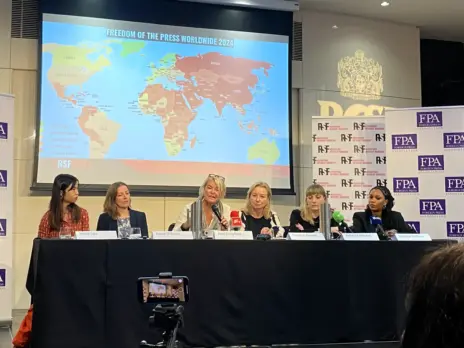
A document lodged with a witness statement in litigation is public and can be disclosed to the media, a High Court judge has ruled.
The decision, by Mr Justice Bean, has been made in proceedings being reported by The Guardian in which a woman is suing services company Serco claiming she was sexually assaulted by one of its employees.
The newspaper has been granted access to an internal document prepared by Serco that was disclosed in the course of proceedings.
It is the first case in which a High Court judge has held that where a witness statement is adopted in evidence its exhibits become public documents.
It will be an important judgment for the media, leading to greater access to documents produced in litigation.
In his decision last week, the judge pointed out that the public interest was in the issue of how Serco handled the investigation into the complaints made by the woman, referred to only as NAB.
She alleged that she was assaulted by a male nurse, referred to as T, while detained at Yarl's Wood Immigration Removal centre, which was and is run by Serco, between October 2010 and February 2011.
In January 2011 she complained of three sexual assaults by the male nurse, and Serco commissioned a report by its deputy head of security and operations.
In November 2011, NAB sued Serco, the Home Office and Bedfordshire Police in relation to the alleged assaults and her detention.
The police settled the claim, as, later, did Serco, but the claim against the Home Office went to trial in July last year. The trial judge found that NAB was unlawfully detained at Yarl's Wood from February 3-17, 2011, but otherwise dismissed her claim for unlawful detention.
Mr Justice Bean said the Serco report on NAB's allegations remained an exhibit to one of the witness statements, and as such was in the trial bundle, but was not referred to in the skeleton arguments or reading lists lodged by counsel before the trial.
Subsequently, The Guardian wrote to Serco saying that it was aware of the report and, unless the firm agreed that it was now a public document, it would apply to the court for access to it.
The newspaper then applied to the High Court for a ruling under Rule 31.22(1)(a) of the Civil Procedure Rules (CPR) that the report was a public document, or a ruling under Rule 31.22(1)(b) that it was entitled to a copy of the document.
Mr Justice Bean said the evidence was that the Serco report was not read aloud, in whole or in part, in the course of the trail of NAB's claim against the Home Office.
As it was not referred to in the skeleton argument or reading list filed by counsel for either side it was also unlikely that it was read by the judge.
But it was referred to in a witness statement made by NAB's solicitor.
"The authorities indicate that documents exhibited to an affidavit or witness statement are to be treated for the purposes of inspection as if they formed a part of the affidavit or witness statement itself," Mr Justice Bean said.
He was satisfied that the report was "referred to" at the trial, meaning that the rule governing The Guardian's application was Rule 31.22(2), the power to restrict the use of a document referred to at a public hearing, rather than CPR 31.22 (1) (b), the power to give permission to use disclosed documents which were not referred to in public.
The common law governing the disclosure of documents had changed significantly, as shown by the most recent authority, the decision of the Court of Appeal in R (Guardian News & Media Ltd) v City of Westminster Magistrates Court ([2013] QB 618). All earlier authorities now had to be viewed in the light of the decision in that case and the ruling in R (Mohammed) v Secretary of State for Foreign & Commonwealth Affairs ([2011] QB 218).
Mr Justice Bean said that Lord Toulson had acknowledged in the Guardian v Westminster case that the decision broke new ground in the application of the principle of open justice, although not in relation to the nature of the principle itself. The judge said Rule 5.4C of the CPR recognised that there may be a legitimate public interest in the inspection not only of statements of case lodged with the court, but also, with permission, other documents such as witness statements or exhibits placed on the court file.
"The public interest is not confined to cases where the court has given judgment and it is sought to see whether the underlying documents provide further illumination of the judgment," he said.
"It may be just as significant to discover why a case settled."
He went on: "I have considered whether the public interest in open justice is outweighed in this case by the risk of harm to the legitimate interests of others. The Article 8 rights of T and NAB have to be considered. Both are named in the report; he is also named in the pleadings."
The Guardian, he said, had offered an undertaking that it would ensure that both NAB and T would remain anonymous if it was allowed access to the Serco report.
"The public interest is in how Serco handled the investigation, not in the identity of the complainant or of the man subject to the complaint," said Mr Justice Bean, adding that T had not been arrested or charged with an offence following NAB's complaints.
He went on: "The only other risk of harm is to the reputation of Serco. Even that risk can be exaggerated. The particulars of claim filed on behalf of NAB and other pleadings are public documents subject to inspection as of right under CPR 5.4C (1). The fact of the allegations having been made is therefore in the public domain.
"The Guardian has a proper journalistic purpose in seeking to inspect a document which they believe may throw light on whether or not the allegation was properly investigated," he said, adding that the newspaper should be allowed access to the report and should be free to publish its contents.
Email pged@pressgazette.co.uk to point out mistakes, provide story tips or send in a letter for publication on our "Letters Page" blog






